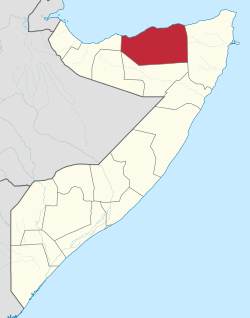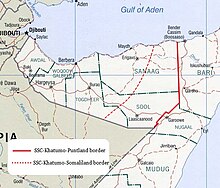Sanaag
Sanaag
سناج | |
|---|---|
 Overview of the Cal Madow mountains in Sanaag, Somalia. | |
 Location in Somalia. | |
| Country | |
| Capital | Erigavo |
| Time zone | UTC+3 (EAT) |
Sanaag (Template:Lang-so, Arabic: سناج ) is an administrative region (gobol) in northern Somalia.[1] Its capital city is Erigavo. Sanaag has a long coastline facing the Gulf of Aden to the north, and is bordered by the Somali regions of Woqooyi Galbeed, Togdheer, Sool and Bari.
The most important towns in the region are Erigavo, Badhan, Las Khorey, Dhahar, Laako, El Afweyn, Buraan, Kulmiye, Yufle, Hadaftimo, Mindigale, Hingalol, Heis, Yubbe, El Buh, Damale Hagare, Maydh, El Ayo, Armale, Fiqifuliye and Gar Adag.
Local control of Sanaag is disputed between Somaliland and Puntland.
History

The Sanaag region and northern Somalia in general is home to numerous archaeological sites, with ancient ruins, buildings and cairns found at Haylaan, Qa’ableh, Qombo'ul, Maydh and Elaayo, among other places. However, many of these old structures have yet to be properly explored, a process which would help shed further light on local history and facilitate their preservation for posterity.[2]
The Warsangali Sultanate was an imperial ruling house centered in northeastern and in some parts of southeastern Somalia. It was one of the largest sultanates ever established in the territory, and, at the height of its power, included the Sanaag region and parts of the northeastern Bari region of the country, an area historically known as Maakhir or the Maakhir Coast. The Sultanate was founded in the late 13th century in northern Somalia by a group of Somalis from the Warsangali branch of the Darod clan, and was ruled by the descendants of the Gerad Dhidhin.
Demographics
The Sanaag region is mainly inhabited by people from the Somali ethnic group, The four major population groups in the Sanaaq region were respectively the Harti clans Warsangeli and Dhulbahante and the Isaaq clans Habr Jallo and Habr Yonis, all of which were roughly the same size.[3]
Geography

Climate
Sanaag has four zones: the coastal area, the mountain range, the gypsum karsts plateau and the Sool Haud plateau. The latter is rich in pasture and has better water quality. Except for the elevated area of Erigavo district where rainfall records indicate an annual average of up to 800 mm(see "Cal Madow" topic), rainfall generally does not exceed 150 mm in most of the region.
Environment
A severe drought in the region in the early part of the 21st century caused an 80% or greater loss of livestock, though two good rainy seasons in 2004–2005 helped restore the area. Over a 15-year period of analysis, from 1988–2003, there was a 52% loss of forest and a 40% loss of grassland, and a 370% increase in bare land. Soil erosion due to weather and human activities and clearing of wood and brush for such uses as charcoal and fuel are issues leading to a degradation of the environment.[4]
Economy
In recent history, the Sanaag region normally maintained a diverse economy, producing and then exporting to other regions, it produced livestock, frankincense, and leather for export, this was happening while the region lacked basic infrastructure, but sadly, after the outbreak of civil war the region’s economy collapsed from loss of markets and dilapidated infrastructure has never helped, and lack of investment. Now the region only supports one main economy, livestock rearing. The Somali livestock ban imposed by Gulf countries in which was Sanaag’s largest market has virtually destroyed the economy in the region, reducing purchasing power and forcing pastoralists in the region to survive on subsistence activities.[5]
Territorial dispute

Sanaag is a disputed region, claimed as sovereign territory by the two autonomous Somaliland and Puntland macro-regions of Somalia.
The dispute between Somaliland and Puntland stems from 1998, when Puntland formed and declared the region as part of its territory.[6] Prior to that, it had been claimed but with no control over the region by Somaliland since the 1991 events of the Somali Civil War. In 1994, the historic USP political party was reinstated by Awad Ahmed Asharo, former party Chairmain of the main Warsangeli clan. With the support of Sanaag pro-union civil society, local admin and politicians, USP was subsequently recognized by UNISOM as the legitimate representative of Sanaag.[7]
Beginning in 1998, after Puntland was formed, Sanaag was one of the regions of Puntland, with Sanaag elected politician given the Speaker of the House position in a power sharing agreement. Thus, both the police and army of Puntland were already established in the region based on the desires of the local population for their security and the territorial integrity of Somalia. The separatist Somaliland administration, however, still claimed the territory as part of the original but colonial boundary of British Somaliland. Fighting between the two forces led to casualties and captured prisoners, who were later exchanged.
The dispute with the TFG stems from the passage of the new Charter in November 2004. However, this was not a pragmatic issue until the military successes of the government in the 2006–2007 war in Somalia. Assertions of sovereignty in January 2007 by the TFG leadership sparked riots in Somaliland for reunification with the south.[8]
On July 1, 2007, the state of Maakhir was declared in the area. It claimed autonomy from both Puntland and Somaliland,[9] but was eventually incorporated into Puntland in January 2009.[10]
Recently the elders from this region and nearby region of Sool which is also disputed have issued joint statement submitted to various agencies declaring their position on unity of Somalia and rejecting notion of Somaliland secessionist agenda, however some of native to both regions are in Somaliland administration.[11]
Districts

According to the federal government of Somalia, prior 1991, Sanaag was divided into 5 Districts which are as follows:[12]

According to the Puntland administration, the Sanaag region consists of 10 districts with Badhan being the Capital of the region. The Transitional Federal government also recognizes Puntland as an official state so as its regions and districts. The Districts of Sanaag are:

- Erigavo
- Mindigale
- Habarshiro
- Hadaaftimo
- Hingalol
- Dhahar
- Laako
- Buraan
- Xabasha Wacle
- Badhan
- Las Khorey
- Kaladhacda
- El Buh
- Mindigale
According to the Somaliland administration, as of July 2002, Sanaag was formally divided into 10 districts, rated "A" through "D" in terms; districts graded "D" were limited, because "their district councils shall not be elected at first local government elections as their borders have not yet been delineated."[13] Thus, under the 2005 elections for the lower house of Parliament, Sanaag was described as only having six districts.[14] Here is the list of districts of Sanaag and their "Grade":

- Erigavo (A)
- El Afweyn (C)
- Badhan (A)
- Las Khorey (A)
- Dhahar (A)
- Gar-adag (C)
- Maydh (D)
- Hingalol (B)
- El Buh (B)
- Buraan (B)
- Hadaftimo (B)
- Yubbe (B)
Notable Sanaagians
- Mohamoud Ali Shire, Sultan of former British Somaliland (1897–1960)
- Farah Mohamed Jama Awl, writer
- Jama Korshel, Somali Army General, former Head of Somali Police and one of the leaders of 1969 coup d'état of Somalia
- Hasan Hayle (Xasan Xayle), poet from Las Khorey
- Fatima Jibrell, founder of the Horn of Africa Relief and Development Organization (Horn Relief)
- Mohamed Nuur Giriig, classical singer
- Abdillahi Mohammed Ahmed, known as Qablan, former Under-Secretary of Finance
- Abdullahi Ahmed Jama ‘Ilkajir’ Somali Army General and Interior Minister of Puntland.
See also
Notes
- ^ Regions of Somalia Archived October 23, 2016, at the Wayback Machine
- ^ Michael Hodd, East African Handbook, (Trade & Travel Publications: 1994), p.640.
- ^ World, Ref. "Report on the Fact-finding Mission to Somalia and Kenya (27 October - 7 November 1997)". Ref World. Danish Immigration Service. Retrieved 7 August 2014.
- ^ "Environmental Study of Degradation in the Sool Plateau and Gebi Valley: Sanaag Region of Northern Somalia" (PDF). Horn Relief. February 2006. Retrieved 6 February 2007.
- ^ "Archived copy". Archived from the original on 2016-03-05. Retrieved 2012-01-28.
{{cite web}}: Unknown parameter|deadurl=ignored (|url-status=suggested) (help)CS1 maint: archived copy as title (link) - ^ "Remarks on the 1998 Charter of Puntland State of Somalia". Somalia Watch. 12 August 2000. Retrieved 18 January 2007.
- ^ "USP and the means of its political weight - Historical Understanding". Somalia Watch. February 1994. Retrieved 19 February 2009.
- ^ "Pro-government rally take place in northwest Somalia". Shabelle Media Network. 17 January 2007. Archived from the original on September 30, 2007. Retrieved 19 January 2007.
{{cite news}}: Unknown parameter|deadurl=ignored (|url-status=suggested) (help) - ^ The Formation of The Maakhir State of Somalia[permanent dead link]
- ^ Worldstatesmen - Maakhir Archived May 8, 2016, at the Wayback Machine
- ^ [1][permanent dead link]
- ^ Gwillim Law, "Districts of Somalia " Archived May 8, 2016, at the Wayback Machine, Statoids, December 31, 1990
- ^ "Republic of Somaliland: Regions and Districts Law (Law No: 23/2002)". Translation of Republic of Somaliland government document. 29 July 2002. Archived from the original on 26 November 2006. Retrieved 22 February 2007.
- ^ "Somaliland: Elections for the Lower House of Parliament September 2005" (PDF). Norwegian Centre for Human Rights/NORDEM. September 2005. Retrieved 22 February 2007. [dead link]
External links
- Warsangeli Sultanate
- Gwillim Law, "Districts of Somalia", Statoids, December 31, 1990
- AllSanaag.com

